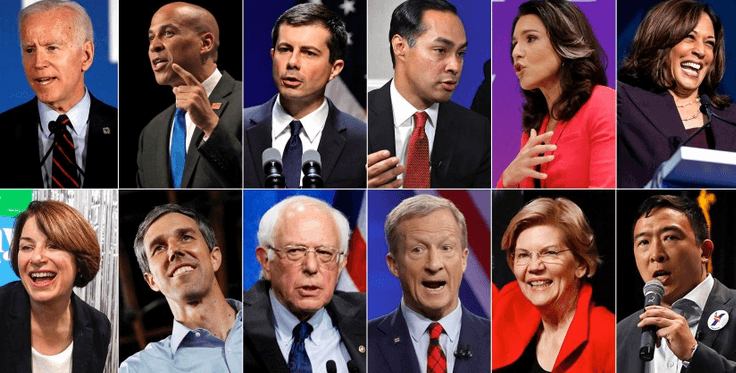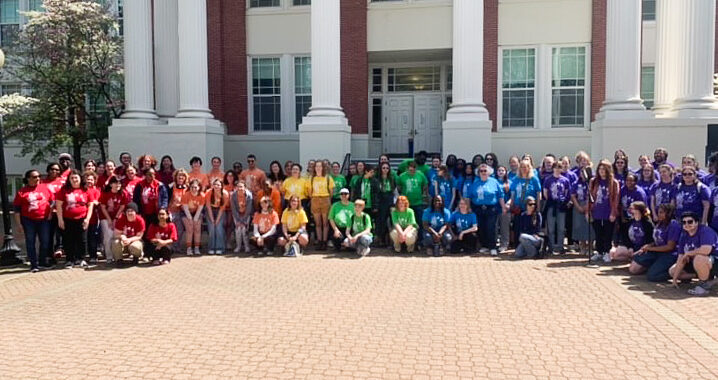Students respond to policies discussed at the fourth Democratic debate
4 min read
The twelve candidates discussed healthcare, gun laws and US Intervention in the Middle East / LA times
by BERNADETTE D’AURIA
Staff Writer
UMW students tuned into the fourth Democratic presidential nomination debate on Oct. 15. Traditionally, the candidates give an opening statement regarding their stances, but as there was a record number of candidates for this point in the presidential primary debate, opening statements were cut in order to make time for discussing policy stances and what each candidate has to offer America.
The first question presented to the twelve candidates regarded the official impeachment inquiry that House Democrats launched against President Donald Trump. Massachusetts Senator Elizabeth Warren was the first to be addressed by the moderator, who asked, “why shouldn’t it be the voters who determine the president’s fate?”
Warren expressed that the inquiry was larger than a political scheme and that it presents an opportunity to demonstrate that no one person is above the law. This sentiment was unanimously shared among the rest of the candidates, who all voiced their support for the impeachment inquiry.
Health insurance policies were also discussed. Pete Buttigieg, mayor of South Bend, Indiana, voiced his support for the American people to have a choice to switch to a Medicare plan or to continue to remain under a private health insurance plan. Warren was met with scrutiny over her proposed Medicare for all plan that failed to address whether or not it would result in higher taxes. Vermont Senator Bernie Sanders acknowledged that under his Medicare for all plan, there would be a tax increase for the middle class.
Hope Mills, a sophomore biology major and member of Young Democrats, is partial towards Sanders’ plan. “While his plan may raise taxes for the middle class, we wouldn’t have to worry about paying for insurance, so they could easily balance each other out,” said Mills.
American foreign policy was a pressing concern among the candidates in the wake of Trump’s withdrawal of American forces from Syria, a move that has resulted in the United States’ long-time Kurdish allies facing Turkish forces without American aid. Rather than address whether the candidates on stage would have made the same decision, the moderators focused on whether the candidates, if elected, would send American troops back into northern Syria.
Hawaii Congresswoman Tulsi Gabbard, a veteran, argued in favor of pulling American troops out of Syria. “The slaughter of the Kurds being done by Turkey is yet another negative consequence of the regime change war,” said Gabbard.
Buttigieg, also a veteran, argued against her response and claimed that the slaughter is a direct consequence of America pulling out of Syria.
Sam Hartz, a junior American Studies major and Young Democrats president, thought their discussion could have been expanded on.
“It was good to get those two different foreign policy visions…but I think they could have focused more on foreign policy beyond just the Syria question. It’s really the one area of American policy that a president has the most control over, so it’s a shame that it didn’t get more attention,” said Hartz.
One of the final issues addressed was gun control. Buttigieg and Texas Congressman Beto O’Rourke were avid about their stances on the mandatory buybacks of AR-15s and AK-47s. O’Rourke has previously claimed that under his presidency there would be a mandatory buyback of these weapons that would be enforced under the trust of the American people to “do the right thing.” Buttigeg critqued his stance and argued that the only way a buyback would work is if law enforcement went door to door to search for the weapons, ultimately concluding that O’Rourke’s plan was too vague.
Mills felt Buttigieg’s argument had some merit, because, while she supports the idea of mandatory buybacks, she feels the practice could be too messy.
“Buybacks are a good plan for anyone who is willing to surrender their firearms, but it seems a bit hard to implement. People don’t want to give up their guns, so they’re not going to surrender them even if it’s mandatory,” said Mills.
The ways in which the candidates approached the debate was met with criticism among some students. Mills felt a more narrow discussion of the candidates policies would have been more preferable than the broad statements seen at this debate.
“The candidates answered questions but there were still a lot of personal attacks. They could have spent this time expanding on these issues or other things like climate change,” said Mills.
Erin Wilson, a sophomore education major and Young Democrats member, thinks that the ability to explore policy was undermined by personal attacks. “All the gun violence discussion was shot down due to Beto and Pete’s arguing,” said Wilson.
Despite the opposing methods of many of the candidates, the students interviewed were ultimately surprised by how well-conducted the fourth debate went. “I thought it was going to be chaos,” said Hartz. “It was maybe the least hectic and most policy-focused of the debates so far.”
All three members of Young Democrats expressed that they would be tuning in for November’s debate and hope to see more expansion on the policies discussed during this debate as well as a less crowded stage.
Wilson is hoping that the next debate will get more serious. “I want well thought-out plans,” Wilson said. “I’m tired of dancing around questions, I’m hoping that one of the candidates gets me to believe in them.”











